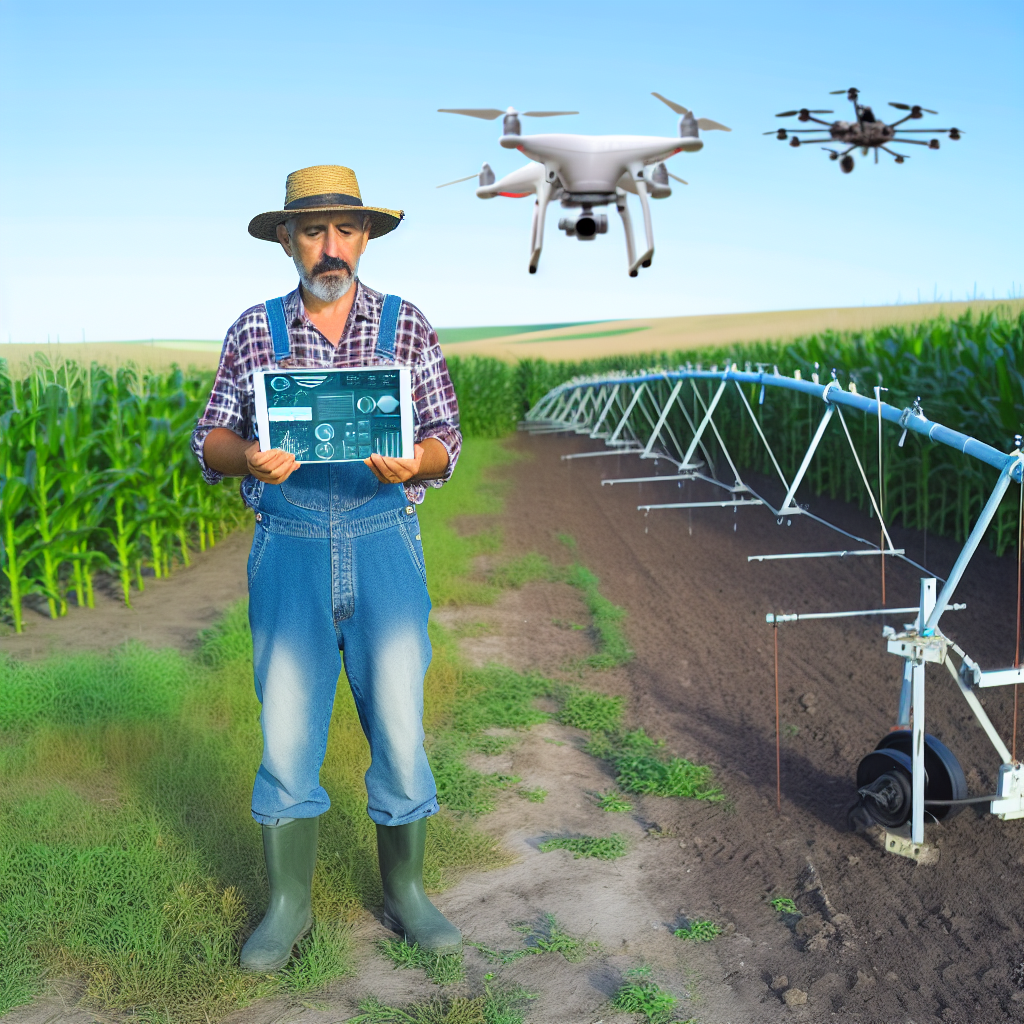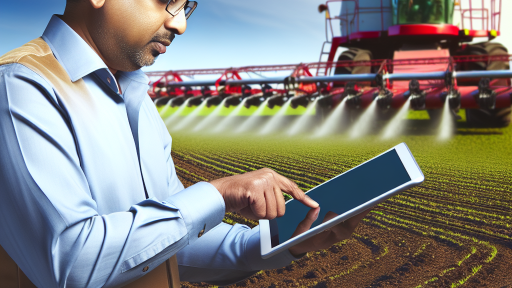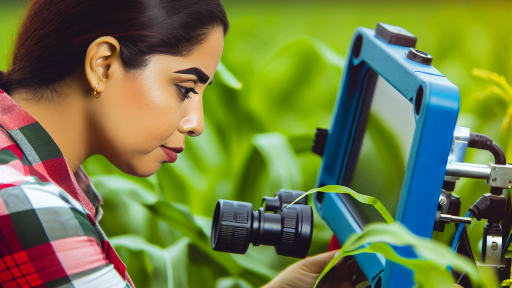Introduction to Smart Irrigation
Definition of Smart Irrigation
Smart irrigation refers to advanced technology-based systems that optimize water use.
These systems use data analytics and sensors to improve irrigation efficiency.
Moreover, smart irrigation adapts to weather conditions and soil moisture levels.
Consequently, farmers can make informed decisions about when and how much to irrigate.
Importance of Smart Irrigation
Smart irrigation plays a crucial role in sustainable farming practices.
It conserves water resources, reducing waste and conserving valuable supplies.
In addition, it enhances crop yields by providing the right amount of water at the right time.
This method significantly lowers energy costs associated with traditional irrigation methods.
Furthermore, smart irrigation contributes to environmental protection by minimizing runoff.
As a result, it helps maintain ecosystems and supports responsible water use.
Benefits of Implementing Smart Irrigation
Implementing smart irrigation brings numerous advantages for farmers.
- Improved water efficiency boosts crop health and productivity.
- Automated systems reduce labor costs and the need for manual intervention.
- Data-driven insights allow for precise application and resource allocation.
- Farmers can easily monitor systems remotely, enhancing convenience.
- Moreover, these systems provide customizable settings based on specific crop needs.
Challenges and Considerations
Despite its benefits, smart irrigation also faces challenges.
Initial installation costs can be substantial, posing barriers for some farmers.
Additionally, technical expertise is necessary to operate and maintain advanced systems.
Moreover, data privacy and security concerns may arise with increased technology use.
Transform Your Agribusiness
Unlock your farm's potential with expert advice tailored to your needs. Get actionable steps that drive real results.
Get StartedYet, tailored solutions and financial support can help overcome these obstacles.
Overall, the advantages often outweigh the challenges when implemented correctly.
Key Technologies Used in Smart Irrigation Systems
Soil Moisture Sensors
Soil moisture sensors measure the water content in the soil.
They provide real-time data on moisture levels.
This technology helps farmers determine irrigation needs accurately.
Weather Stations
Weather stations collect meteorological data relevant to farming.
They monitor rainfall, temperature, and humidity levels.
This information assists in making informed irrigation decisions.
Irrigation Control Systems
Irrigation control systems automate the watering process.
They allow for remote management of irrigation schedules.
Farmers can optimize water usage and reduce waste.
Drip Irrigation Technology
Drip irrigation delivers water directly to the root zone.
This method reduces evaporation and runoff significantly.
Moreover, it promotes efficient water usage in crop production.
Smartphone Applications
Smartphone apps enable farmers to manage irrigation on-the-go.
These applications provide alerts and performance monitoring options.
Additionally, they help in scheduling irrigation more effectively.
Data Analytics and Machine Learning
Data analytics process large sets of irrigation data.
Machine learning algorithms can predict irrigation needs accurately.
Farmers benefit from actionable insights to enhance yield.
Cloud Computing
Cloud computing offers a platform for data storage and sharing.
Farmers can access information from anywhere, anytime.
This connectivity supports better collaboration and management.
Benefits of Smart Irrigation for Water Conservation
Improved Water Efficiency
Smart irrigation systems use advanced technology to optimize water usage.
Showcase Your Farming Business
Publish your professional farming services profile on our blog for a one-time fee of $200 and reach a dedicated audience of farmers and agribusiness owners.
Publish Your ProfileThis enhances efficiency by delivering the exact amount of water plants need.
Consequently, this reduces water waste and conserves valuable resources.
Data-Driven Decisions
Smart systems utilize real-time data for irrigation scheduling.
This includes soil moisture levels, weather forecasts, and plant needs.
As a result, farmers can make informed decisions that enhance growth.
Reduced Labor Costs
Automation in smart irrigation minimizes the need for manual labor.
Farmers can focus on other essential tasks rather than watering.
Thus, this technology can lead to overall cost savings for operations.
Environmental Benefits
Less water usage contributes positively to local ecosystems.
Smart irrigation reduces runoff and pollution in nearby waterways.
This helps maintain the health of surrounding habitats and wildlife.
Increased Crop Yields
Consistent and appropriate watering promotes healthy crop growth.
Greater yields translate into more food production and less waste.
Farmers can thus provide a stable food supply for communities.
Scalability and Flexibility
Smart irrigation systems are adaptable to different farm sizes.
This technology can be tailored to various crops and climates.
Moreover, it allows for easier expansion as farming operations grow.
Long-Term Cost Savings
Investing in smart irrigation leads to substantial water savings over time.
Decreased dependency on water resources lowers overall operating costs.
These savings can be redirected to further improve farm sustainability.
Explore Further: Automating Farm Operations with Sensor Technology
Integration of IoT in Smart Irrigation Practices
Understanding IoT in Agriculture
The Internet of Things (IoT) transforms agricultural practices significantly.
It connects devices and systems for improved efficiency.
Farmers can monitor real-time data with IoT applications.
This technology enhances resource management on farms.
Benefits of Smart Irrigation
Smart irrigation systems optimize water usage.
They reduce waste and ensure adequate hydration for crops.
Crop yields improve with timely irrigation.
Farmers save money on water costs over time.
Key Components of Smart Irrigation Systems
Smart irrigation systems include sensors, controllers, and weather stations.
Sensors detect soil moisture levels accurately.
Controllers automate irrigation schedules based on data.
Weather stations provide forecasts to anticipate rainfall and adjust accordingly.
Implementation Challenges
While beneficial, IoT integration comes with challenges.
The initial setup costs may deter some farmers.
Moreover, technical skills are essential for managing IoT systems.
Regular maintenance is necessary to ensure optimal performance.
Future Trends in Smart Irrigation
The future of smart irrigation looks promising.
Advancements in AI will enhance decision-making processes.
Moreover, increased connectivity will improve system integration.
Showcase Your Farming Business
Publish your professional farming services profile on our blog for a one-time fee of $200 and reach a dedicated audience of farmers and agribusiness owners.
Publish Your ProfileThese trends will further empower farmers to utilize technology effectively.
Discover More: Optimizing Water Use with Crop Monitoring Sensors
Case Studies: Successful Implementation of Smart Irrigation
Introduction to Case Studies
Smart irrigation plays a crucial role in sustainable agriculture.
This technology optimizes water use and enhances crop yields.
Various farms worldwide have successfully implemented smart irrigation practices.
Case Study: Green Valley Farms
Green Valley Farms adopted smart irrigation in 2021.
They implemented a drip irrigation system that reduced water usage by 40%.
This system monitored soil moisture in real-time.
As a result, crop production increased by 25%.
Farmers experienced substantial cost savings on water bills.
Case Study: Sunny Fields Agricultural Cooperative
Sunny Fields implemented precision irrigation techniques in 2020.
Using sensors, they adjusted water delivery based on real-time data.
These adjustments improved water efficiency by 50%.
Crops, such as tomatoes and cucumbers, showed significant yield improvements.
Additionally, farmers reported enhanced soil health and fertility.
Case Study: Oasis Farms
Oasis Farms incorporated smart irrigation systems in 2019.
They utilized automated scheduling to optimize watering times.
This approach minimized evaporation and runoff.
The farm observed a 30% decrease in water usage.
Moreover, crop quality improved with better water management.
Lessons Learned from These Case Studies
These case studies highlight the benefits of smart irrigation.
Farmers experienced increased efficiency and sustainability.
Additionally, these practices contributed to reduced operational costs.
Technology integration can significantly enhance agricultural practices.
Adaptation of smart irrigation methods is vital for future farming success.
Gain More Insights: Automated Harvesting Techniques Explained

Challenges and Limitations of Smart Irrigation Technologies
High Initial Costs
Implementing smart irrigation systems often requires significant investment.
Farmers may face costs for technology and installation.
In many cases, this financial barrier limits adoption.
Technical Complexity
The complexity of smart irrigation systems poses a challenge for some users.
Farmers may need training to operate and maintain these systems effectively.
This necessity can deter those with limited technical knowledge.
Dependence on Technology
Smart irrigation relies heavily on technology and data.
Technical failures can disrupt irrigation processes.
This reliance can lead to decreased efficiency in critical situations.
Environmental Limitations
Smart irrigation systems may not function optimally in all environments.
Varied soil types and climatic conditions affect system performance.
This factor limits the universality of these technologies.
Data Management Challenges
The collection and analysis of data require robust systems.
Farmers may struggle with integrating this data into decision-making.
Showcase Your Farming Business
Publish your professional farming services profile on our blog for a one-time fee of $200 and reach a dedicated audience of farmers and agribusiness owners.
Publish Your ProfileData overload can also complicate meaningful insights.
Limited Connectivity
Many smart irrigation systems depend on internet connectivity.
Poor connectivity in rural areas may hinder system effectiveness.
Farmers in such areas may experience a lack of real-time monitoring.
Learn More: Integrating IoT in Precision Farming Operations
Future Trends in Smart Irrigation Solutions for Agriculture
Integration of Technology
Smart irrigation technology continues to advance rapidly.
Integrating sensors and IoT devices improves water management.
Farmers can monitor soil moisture levels in real-time.
Additionally, automated systems adjust watering schedules efficiently.
This integration ultimately saves both water and energy.
Data-Driven Decision Making
Data analytics plays a crucial role in farming practices.
Farmers can analyze weather patterns and soil conditions effectively.
This information leads to informed irrigation decisions.
Consequently, crop yields improve significantly.
Moreover, predictive analytics can forecast irrigation needs.
Adoption of Renewable Energy
Renewable energy is shaping the future of irrigation systems.
Using solar-powered pumps can reduce operational costs.
Wind and other renewable sources are increasingly practical.
This shift supports sustainable farming and lowers carbon footprints.
Consequently, farmers can achieve eco-friendly irrigation solutions.
Customized Irrigation Solutions
Customization is becoming more prevalent in irrigation technology.
Farmers can tailor systems to specific crop requirements.
Personalized approaches enhance water efficiency effectively.
This customization can lead to optimal growth conditions.
Furthermore, it minimizes waste and maximizes resources.
The Role of Drone Technology
Drones are revolutionizing agricultural practices today.
They provide aerial views for monitoring crop health.
This technology helps in assessing irrigation needs quickly.
Farmers can identify areas requiring additional water supplies.
Furthermore, drones can assist in mapping irrigation layouts.
Public Awareness and Education
Raising public awareness about smart irrigation is vital.
Educating farmers on technology benefits promotes adoption.
Workshops and online resources enhance understanding effectively.
Subsequently, better practices lead to improved community resilience.
Ultimately, education fosters sustainability in agriculture.
Best Practices for Farmers to Adopt Smart Irrigation Techniques
Understanding Smart Irrigation
Smart irrigation involves utilizing technology to optimize water use.
This approach conserves water while enhancing crop health and yield.
Farmers can leverage various techniques for effective management.
Using Soil Moisture Sensors
Soil moisture sensors provide real-time data on moisture levels.
Farmers can adjust irrigation schedules based on accurate readings.
Showcase Your Farming Business
Publish your professional farming services profile on our blog for a one-time fee of $200 and reach a dedicated audience of farmers and agribusiness owners.
Publish Your ProfileThis strategy reduces overwatering and fosters healthier crops.
Implementing Weather-Based Irrigation Controllers
Weather-based controllers adjust irrigation based on local weather conditions.
These systems consider rainfall and temperature changes.
Consequently, farmers avoid unnecessary water usage.
Employing Drip Irrigation Systems
Drip irrigation delivers water directly to the plant roots.
This method minimizes evaporation and runoff.
Farmers can save substantial amounts of water and reduce weed growth.
Regular Monitoring and Maintenance
Regular checks ensure efficient operation of irrigation systems.
Farmers should inspect for leaks and blockages frequently.
Maintaining equipment prevents water waste and system damage.
Training and Education
Continuous education on smart irrigation is essential for farmers.
Workshops and online courses can enhance knowledge and skills.
Informed farmers can implement new technologies effectively.
Collaborating with Agricultural Extensions
Farmers should collaborate with local agricultural extension services.
These organizations provide valuable resources and support.
They can offer advice on best irrigation practices and technologies.
Additional Resources
AI in Agriculture and Farming: Revolutionizing Crop Growth – Intellias
Precision Agriculture in the Digital Era: Recent Adoption on U.S. Farms




